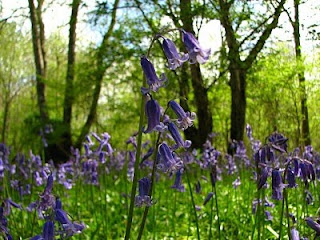
Circle West discuss waste and “stuff” and how to begin a Transition Circle Hethersett; The Strangers’ dry run their first wholefood coop order; a new cycle of Carbon Conversations begins in Norwich and Diss and Elena Judd finds the perfect book for those of us who can’t let the plane take the strain any longer. Keep the date Friday June 21 free, as we’re planning a Transition Circles party to celebrate a whole year of low-carbon living.
Strangers’ Circle – Monday 7 June
At our Strangers' Circle in April we started our get-together as always with a feast of home-cooked food: Angie's onion pakoras, William's egg salad with new lettuce from the Mangreen polytunnel, Elena's carrot and cumin soup, Mark's spelt rolls, my cherry-plum and rhubarb compotes . . . . and in-house nettle soup. Our low-carbon supper set us up so we could get down to draw up our first order as a Transition wholefood co-op - a real community exercise! We had all kinds of debates on the merits of poppy seeds, whether we should choose raisins or sultanas, what colour lentils. Some things we were unanimous about - extra virgin olive oil, fairtrade brown basmati rice, local bread flour . . . Tully did the figures on his laptop, Elena held sway over the catalogue, Mark made tea, Naomi and I negotiated kilos of gluten-free pasta. Oh, and we laughed a lot.
This week we’re meeting to divvy up the goods! As well as celebrating the birthdays and anniversaries in our group with low-carbon cakes and ale. Now we have to work out where to put everything - invent storehouses in ingenious corners of our houses.
Carbon Conversations – 9 June
If you had said to me that I’d be finding out exactly how many KW the washing machine takes on a 40 degree cycle, or considering sharing a car with my neighbours a year ago I would have laughed. Me an anorak! But then TN2 happened and I vowed to reduce my carbon to four tons. And now I’ve started Carbon Conversations, a structured approach to carbon cutting, and I’m looking at those unglamourous statistics even more.
The first of six sessions was an introduction to the main ideas behind the course - which is to focus directly on what changes individuals and communities can make. Following a workbook we had lively two-hander and group debates about low-carbon challenges, the responsibility for climate change and our beliefs about humanity and the earth’s resources.
"I prefer to face reality," said one of the group afterwards. "When I know, I can have hope." It’s true you need to look at facts, otherwise you remain conveniently in the dark (especially when it comes to car mileage). Reality, even when it's tough, is something you can share with people and laugh about, illusions are solitary and frightening because you spend your life in hiding, fending off the truth of the matter. We went home happily with Jeremy Leggett’s Half Gone and a DVD of An Inconvenient Truth in our hands. And of course, homework . . . haven’t done that for about 30 years! (Charlotte Du Cann/Strangers' Circle)
Carbon Conversations continues this month and will discuss Home Energy and Transport
The Man in Seat 61 by Mark Smith
I've long known about the website The Man in Seat 61, which provides lots of information about travelling through Europe by train. I've looked at it a couple of times, and gone away, defeated by the sheer amount of information and the way the site is laid out. I'm sure other people get along just fine with it, but it was always a bit much for me.
Then, wandering around Poringland Library, I spotted The Man in Seat 61 - the book! What a wonderful find! It's clear, precise and full of inspiring ideas as well as information. I had no idea it is possible to travel from London to Greece in 48 hours by train and ferry.
It tells you exactly where, how and how much. There's phone numbers and websites for buying tickets; scenic route recommendations; language guides and information on what to take.
The book is a couple of years old now, and if you're planning a journey, it's probably worth supplementing the book with a peek at the website. (Elena Judd/Strangers’ Circle)
Above: Charlotte (Strangers' Circle) and Kerry (Circle West) meeting at the Bicycle Shop Cafe; Man in Seat 61; Christine introducing the Carbon Conversations.
 We came from Bungay by bus and Hethersett by bicycle (and from quite close by, by car - but with very heavy boxes). The list of plants we swapped was huge: kale for valerian, quinces for sunflowers, squashes for raspberries; tomatoes, Slovak white peppers, lettuces, aubergines, datura, feverfew, chillies and much more.
We came from Bungay by bus and Hethersett by bicycle (and from quite close by, by car - but with very heavy boxes). The list of plants we swapped was huge: kale for valerian, quinces for sunflowers, squashes for raspberries; tomatoes, Slovak white peppers, lettuces, aubergines, datura, feverfew, chillies and much more.













 http://transitionfreepress.org/subscribe/
http://transitionfreepress.org/subscribe/